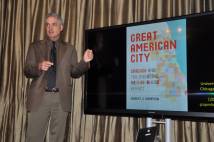Why place matters: 2014 Henry Hart Rice Urban Policy Forum at NYU Wagner features urban expert Robert J. Sampson

The 2014 Henry Hart Rice Urban Policy Forum at NYU Wagner attracted more than 100 people to hear Robert J. Sampson discuss his ambitious research, spelled out in his recently published book, Great American City: Chicago and the Enduring Neighborhood Effect, arguing that communities still matter because life is decisively shaped by where one lives.
To demonstrate the potently enduring impact of place, Professor Sampson, an influential Harvard University scholar, outlined the results of more than a decade’s research in the Windy City, combined with his own unique personal observations about urban life from Cabrini Green to Trump Tower, and from Millennium Park to the intentionally demolished Robert Taylor Homes (now a grassy field where 30,000 low-income Chicagoans once resided, he noted).
Professor Sampson’s work, following in the tradition of the Chicago School of urban studies but updated for the 21st century, discovered that neighborhoods influence a wide variety of social phenomena, including crime, health, civic engagement, home foreclosures, teen births, altruism, leadership networks, and immigration. Even national crises cannot halt the impact of place, Sampson finds: he analyzed the consequences of the Great Recession and its aftermath, bringing his magisterial study up to the fall of 2010.
Professor Sampson was welcomed to NYU Wagner by Dean Sherry Glied, who offered welcoming remarks. Using data graphs to illuminate his findings, he argued that the power of neighborhood as a major determinant of one’s life chances – affecting one’s vulnerability to crime, incarceration, poverty, for example – has remained remarkably constant over decades. “You can see change, but the modal picture is stickiness,” he said.
The speaker is the Henry Ford II Professor of the Social Sciences at Harvard, Director of the Boston Area Research Initiative at the Radcliffe Institute for Advanced Study, and a Fellow at the Straus Institute for the Advanced Study of Law and Justice at NYU. Professor Sampson received the Stockholm Prize in Criminology in 2011, and his book Great American City will receive the 2014 Distinguished Scholarly Book Award from the American Sociological Association.
The lively evening of discussion and questions from the audience of students, faculty, and alumni took place on April 30. The urban policy lecture at NYU Wagner, held annually, is named for the late Henry Hart Rice. Mr. Rice was a leader in the world of residential and commercial real estate for six decades. An industry senior statesman, public servant, author, and lecturer, he conceived and developed projects throughout the U.S. and Canada, but made his biggest impact on New York City real estate and urban planning. He was instrumental in preserving and designating Carnegie Hall as a landmark, and in the development of Lincoln Center Plaza. He led the real estate development of Fresh Meadows in Queens, and organized the land assembly that led to the creation of Barney’s on Madison Avenue.
Henry Hart Rice also held key government posts early in his career and helped write the original NYC rent-control rules. He served as the chairman of James Felt Realty Services for almost 40 years. He was also a governor of the Real Estate Board of New York and a member of the New York City Public Development Corporation.